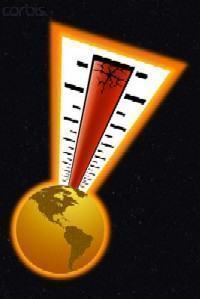Pesquisa confirma consenso científico com relação à ação do homem como uma das prováveis causas do aumento na temperatura global

Indução humana – Um grupo de 3.146 cientistas concordou, em estudo publicado nesta segunda-feira (19/1) na revista Eos, Transactions, American Geophysical Union, que há mais de 200 anos a atividade humana tem contribuído para o aumento na temperatura média global.
O estudo envolveu um inquérito conduzido no ano passado por Peter Doran, professor associado de Ciências da Terra e do Ambiente da Universidade de Illinois, em Chicago, Estados Unidos, em parceria com sua ex-aluna Maggie Kendall Zimmerman, cujos resultados apontam consenso sobre as mudanças climáticas e suas prováveis causas.
Os pesquisadores receberam um convite por correio eletrônico para participar da sondagem realizada pelo site questionpro.com, composta de nove questões curtas.
Doran e Zimmerman contataram inicialmente mais de 10,2 mil especialistas internacionais, listados em 2007 pelo Instituto Geológico Norte-Americano. Apenas os convidados participaram e seus computadores foram registrados para impedir a repetição da votação.
Duas das questões foram consideradas fundamentais: se a temperatura global média tem aumentado em comparação com níveis anteriores a 1800 e se a atividade humana tem sido um fator significativo na mudança da temperatura média global.
Do total, cerca de 90% dos cientistas que responderam ao questionário concordaram com a primeira questão e 82% com a segunda. O maior consenso foi identificado com a análise detalhada das respostas dos climatologistas, sendo que 97% concordaram que os seres humanos têm um papel importante nas causas do aquecimento global.
Por outro lado, os geólogos que trabalham com petróleo e os meteorologistas estiveram entre os mais céticos, uma vez que apenas 47% e 64%, respectivamente, disseram acreditar no envolvimento humano.
“As respostas dos geólogos do petróleo não foram muito surpreendentes, mas a dos meteorologistas nos chamou a atenção. A maioria dos meteorologistas entende o clima, mas muitos estudam o fenômeno das mudanças climáticas há pouco tempo”, disse Doran.
Doran não foi surpreendido, no entanto, pela quase unanimidade de climatologistas. “Eles são os que mais estudam e publicam sobre a pesquisa do clima, o que nos mostra que, quanto mais se sabe sobre o clima, maior a probabilidade de se acreditar na contribuição da humanidade para o aquecimento global”, apontou.
EOS (para assinantes): www.agu.org
Matéria da Agência Fapesp, publicada com informações adicionais do EcoDebate.
Nota do EcoDebate: abaixo trancrevemos release da University of Illinois at Chicago
Survey: Scientists Agree Human-Induced Global Warming is Real
While the harsh winter pounding many areas of North America and Europe seemingly contradicts the fact that global warming continues unabated, a new survey finds consensus among scientists about the reality of climate change and its likely cause. A group of 3,146 earth scientists surveyed around the world overwhelmingly agree that in the past 200-plus years, mean global temperatures have been rising, and that human activity is a significant contributing factor in changing mean global temperatures.
Peter Doran, University of Illinois at Chicago associate professor of earth and environmental sciences, along with former graduate student Maggie Kendall Zimmerman, conducted the survey late last year.
The findings appear today in the publication Eos, Transactions, American Geophysical Union.
In trying to overcome criticism of earlier attempts to gauge the view of earth scientists on global warming and the human impact factor, Doran and Kendall Zimmerman sought the opinion of the most complete list of earth scientists they could find, contacting more than 10,200 experts around the world listed in the 2007 edition of the American Geological Institute’s Directory of Geoscience Departments.
Experts in academia and government research centers were e-mailed invitations to participate in the on-line poll conducted by the website questionpro.com. Only those invited could participate and computer IP addresses of participants were recorded and used to prevent repeat voting. Questions used were reviewed by a polling expert who checked for bias in phrasing, such as suggesting an answer by the way a question was worded. The nine-question survey was short, taking just a few minutes to complete.
Two questions were key: have mean global temperatures risen compared to pre-1800s levels, and has human activity been a significant factor in changing mean global temperatures.
About 90 percent of the scientists agreed with the first question and 82 percent the second.
In analyzing responses by sub-groups, Doran found that climatologists who are active in research showed the strongest consensus on the causes of global warming, with 97 percent agreeing humans play a role. Petroleum geologists and meteorologists were among the biggest doubters, with only 47 and 64 percent respectively believing in human involvement. Doran compared their responses to a recent poll showing only 58 percent of the public thinks human activity contributes to global warming.
“The petroleum geologist response is not too surprising, but the meteorologists’ is very interesting,” he said. “Most members of the public think meteorologists know climate, but most of them actually study very short-term phenomenon.”
He was not surprised, however, by the near-unanimous agreement by climatologists.
“They’re the ones who study and publish on climate science. So I guess the take-home message is, the more you know about the field of climate science, the more you’re likely to believe in global warming and humankind’s contribution to it.”
Doran and Kendall Zimmerman conclude that “the debate on the authenticity of global warming and the role played by human activity is largely nonexistent among those who understand the nuances and scientific basis of long-term climate processes.” The challenge now, they write, is how to effectively communicate this to policy makers and to a public that continues to mistakenly perceive debate among scientists.
Paul Francuch
University of Illinois at Chicago Office of Public Affairs (MC 288)
601 S. Morgan St., Chicago, IL 60607-7113, (312) 996-3456, www.news.uic.edu
[EcoDebate, 21/01/2009]
Inclusão na lista de distribuição do Boletim Diário do Portal EcoDebate
Caso queira ser incluído(a) na lista de distribuição de nosso boletim diário, basta que envie um e-mail para newsletter_ecodebate-subscribe@googlegroups.com . O seu e-mail será incluído e você receberá uma mensagem solicitando que confirme a inscrição.
Fechado para comentários.